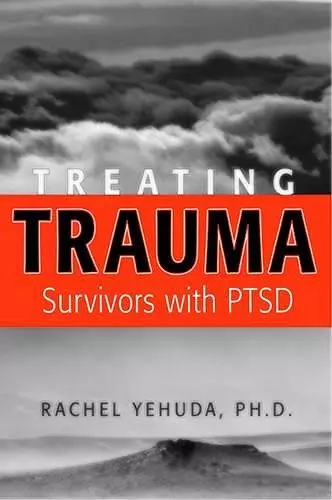Treating Trauma Survivors With PTSD
Format:Paperback
Publisher:American Psychiatric Association Publishing
Published:1st Jul '02
Currently unavailable, and unfortunately no date known when it will be back

In recent years, considerable research, as well as clinical guidelines based on study findings, has been published on the treatment of posttraumatic stress disorder (PTSD). A gap remains, however, between the controlled environments and protocols used in intervention research and the more complex and often imperfect settings and situations that clinicians must navigate in daily practice. Moreover, clinicians routinely see patients whose comorbid substance abuse, self-destructive behavior, or medical illness would likely exclude them from research studies. In short, although the extensive literature is certainly helpful in articulating the various treatment modalities available to clinicians, the strength of the evidence for the efficacy of the treatments, and the recommendations and personal preferences of experts, the literature does not address the real-life dilemmas that clinicians face in attempting to treat trauma survivors.
What is needed is a way to bridge the gap between research and practice—to "translate" study findings into everyday clinical realities. Treating Trauma Survivors With PTSD answers that need. Its authors, experienced researchers and clinicians who are at the forefront of conceptual discourse on trauma and PTSD, are uniquely qualified to offer guidance on these issues. Among the specific topics covered are the following:
• Diagnosis and assessment of and treatment planning for trauma survivors with PTSD, including clinical presentations related to trauma exposure and PTSD and the implications of comorbid symptoms and disorders
• Treatment matching in clinical practice—how treatment outcome findings can be used to develop profiles for predicting which patients are most likely to respond to which treatments
• Medications useful in the treatment of PTSD and the strength of the empirical evidence for their efficacy
• Trauma in children and the efficacy of various treatments, including a discussion of how treatment for children differs from that for adults
• Assessment and treatment of multiply traumatized patients—those with both recent trauma and a history of childhood trauma or abuse
• Treatment of trauma survivors in the acute aftermath of traumatic events, including a review of some of the exciting developments in the field regarding risk factors (e.g., normal vs. pathological coping responses) that influence which individuals are most likely to develop PTSD after such events.
These topics have never been more relevant than now, in the wake of...
The book offers a snapshot of a relatively young field of psychiatric research, revealing important advances and the gaps that remain in our knowledge. . . . The treatment of trauma survivors is a complex, challenging, and often politicized topic. Although more empirical evidence is needed to guide treatment decisions, clinicians will have to continue treating trauma survivors even in the absence of badly needed studies. Thus a dialogue between the researchers and the clinicians will help make treatment decisions as informed as possible and will help make the research more clinically relevant. The goal of this book, as stated in the introduction, is to initiate such a dialogue, and the authors have done their part. Now, it is the reader's turn.
-- Israel Liberzon, M.D. * New England Journal of Medicine *This is an excellent contribution to the material on PTSD. The content is directed to diagnosis and treatment, making it very practical. The busy clinician already versed in treating PTSD through experience will appreciate the clear and critical presentation of research on the topic. Five Stars!
* Doody's Health Science Book Review Journal *This thoughtful volume contains much to admire. Conscientious readers will be struck by how much they didn't know, or didn't think about, in the treatment of trauma survivors. . . . I believe strongly that this book will prove a valuable resource from which advanced trainees (in the various mental health disciplines) as well as experienced practitioners and scientists can construct a more efficacious approach to their work with trauma survivors.
-- Howard B. Roback, Ph.D. * Journal of Clinical Psychiatry *Offering a wonderful collection of timely essays is Treating Trauma Survivors With PTSD, edited by Rachel Yehuda, a well-known researcher and clinician in the area of PTSD and director of the division of traumatic stress at Mount Sinai School of Medicine in New York City. Contributors include Edna B. Foa Ph.D., Alexander C. McFarlane M.D., and Bessel A. van der Kolk M.D. One of the most refreshing dimensions of this volume is the two chapters on matching patients to treatment modality. In an age when even clinicians-let alone laypersons who have been led to expect one-session cures from untested treatments-may take a one-size-fits-all approach to treatment, research indicates that such an approach is bound to fail.
-- Joshua Mark, Ph.D. * Psychiatric ServicISBN: 9781585620104
Dimensions: 229mm x 152mm x 13mm
Weight: 358g
216 pages